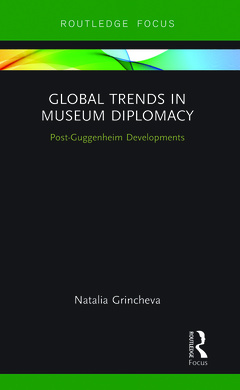Global Trends in Museum Diplomacy Post-Guggenheim Developments Museums in Focus Series
Auteur : Grincheva Natalia

Global Trends in Museum Diplomacy traces the transformation of museums from publicly or privately funded heritage institutions into active players in the economic sector of culture. Exploring how this transformation reconfigured cultural diplomacy, the book argues that museums have become autonomous diplomatic players on the world stage.
The book offers a comparative analysis across a range of case studies in order to demonstrate that museums have gone global in the era of neoliberal globalisation. Grincheva focuses first on the Solomon R. Guggenheim Foundation, which is well known for its bold revolutionising strategies of global expansion: museum franchising and global corporatisation. The book then goes on to explore how these strategies were adopted across museums around the world and analyses two cases of post-Guggenheim developments in China and Russia: the K11 Art Mall in Hong Kong and the International Network of Foundations of the State Hermitage Museum in Russia. These cases from more authoritarian political regimes evidence the emergence of alternative avenues of museum diplomacy that no longer depend on government commissions to serve immediate geo-political interests.
Global Trends in Museum Diplomacy will be a valuable resource for students, scholars and practitioners of contemporary museology and cultural diplomacy. Documenting new developments in museum diplomacy, the book will be particularly interesting to museum and heritage practitioners and policymakers involved in international exchanges or official programs of cultural diplomacy.
Introduction: museum diplomacy then and now 1 Cultural diplomacy of a different kind 2 Museum diplomacy as a corporate enterprise 3 Museum diplomacy as a global franchise Conclusion: museum diplomacy in the neo-liberal age
Dr. Natalia Grincheva is an internationally recognised expert in innovative forms and global trends in contemporary museology, digital diplomacy and international cultural relations. She received many prestigious international academic awards, including Fulbright (2007–2009), Quebec Fund (2011–2013), Australian Endeavour (2012–2013) and SOROS research grant (2013–2014). In 2020 she was awarded a Fellowship for her visiting research residency at the Digital Diplomacy Research Center at the University of Oxford. Her publication profile includes over 45 research articles, book chapters and reports published in prominent academic outlets. Her research focuses on the development of new computational methods to study museums and heritage sites as important players in the creative economy and soft power actors. Dr. Grincheva's professional engagements include her dedicated work for the International Fund for Cultural Diversity at UNESCO (2011) and International Federation of Coalitions for Cultural Diversity (2011–2015), her research industry placement at ACMI X creative hub at the Australian Center for the Moving Image (2017–2019) as well as service for the international Cultural Research Network (CRN) (2018–2020).
Date de parution : 03-2021
13.8x21.6 cm
Date de parution : 07-2019
13.8x21.6 cm
Thème de Global Trends in Museum Diplomacy :
Mots-clés :
MoMA PS1; State Hermitage Museum; China's post-Guggenheim developments; Reina Sofia; contemporary museum diplomacy; Abu Dhabi Governments; neo-liberal globalisation; Yasnaya Polyana; museum governance; Mohammed Bin Zayed Al Nahyan; cultural heritage; Google Cultural Institute; Corporate Development; Louvre Abu Dhabi; Contemporary Chinese Arts; Cultural Diplomacy Activities; Palais De Tokyo; Home Town; Giorgio Armani; Chinese Museums; Hugo Boss; Chinese Government; Global Expansion Strategies; K11 Art; National Tv Channel; Satellite Museum; Nation Branding; Guggenheim Brand; Soft Power; Abu Dhabi



